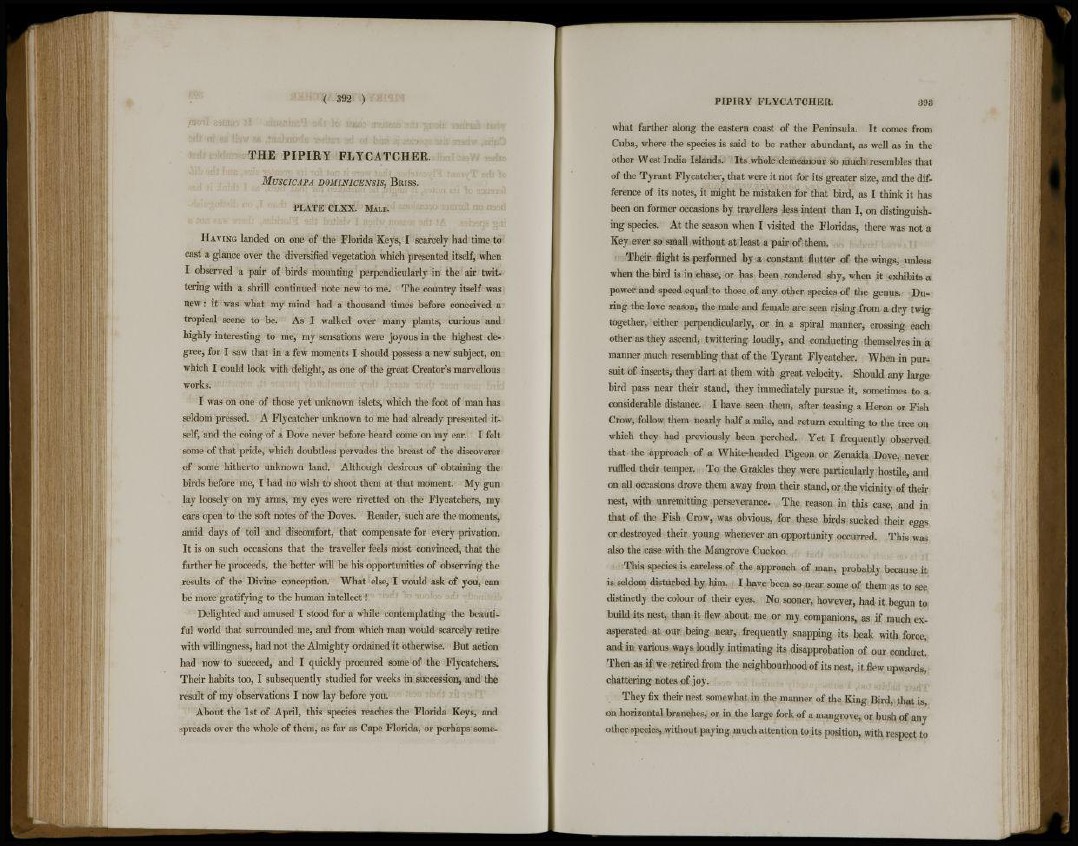
< 392 )
THE P I P I R Y FLYCATCHER.
MUSCÍCAPA DOMINICENSIS, BRISS.
P L A T E C L X X . MALE.
HAVING landed on one of the Florida Keys, I scarcely had time to
cast a glance over the diversified vegetation which presented itself, when
I observed a pair of birds mounting perpendicularly in the air twittering
with a shrill continued note new to me. The country itself was
new: it was what my mind had a thousand times before conceived a
tropical scene to be. As I walked over many plants, curious and
highly interesting to me, my sensations were joyous in the highest degree,
for I saw that in a few moments I should possess a new subject, on
which I could look with delight, as one of the great Creator's marvellous
works.
I was on one of those yet unknown islets, which the foot of man has
seldom pressed. A Flycatcher unknown to me had already presented itself,
and the coing of a Dove never before heard come on my ear. I felt
some of that pride, which doubtless pervades the breast of the discoverer
of some hitherto unknown land. Although desirous of obtaining the
birds before me, I had no wish to shoot them at that moment. My gun
lay loosely on my arms, my eyes were rivetted on the Flycatchers, my
ears open to the soft notes of the Doves. Reader, such are the moments,
amid days of toil and discomfort, that compensate for every privation.
It is on such occasions that the traveller feels most convinced, that the
farther he proceeds, the better will be his opportunities of observing the
results of the Divine conception. What else, I would ask of you, can
be more gratifying to the human intellect!
Delighted and amused I stood for a while contemplating the beautiful
world that surrounded me, and from which man would scarcely retire
with willingness, had not the Almighty ordained it otherwise. But action
had now to succeed, and I quickly procured some of the Flycatchers.
Their habits too, I subsequently studied for weeks in succession, and the
result of my observations I now lay before you.
About the 1st of April, this species reaches the Florida Keys, and
spreads over the whole of them, as far as Cape Florida, or perhaps some-
P I P I R Y F L Y C A T C H E R . 393
what farther along the eastern coast of the Peninsula. It comes from
Cuba, where the species is said to be rather abundant, as well as in the
other West India Islands. Its whole demeanour so much resembles that
of the Tyrant Flycatcher, that were it not for its greater size, and the difference
of its notes, it might be mistaken for that bird, as I think it has
been on former occasions by travellers less intent than I, on distinguishing
species. At the season when I visited the Floridas, there was not a
Key ever so small without at least a pair of them.
Their flight is performed by a constant flutter of the wings, unless
when the bird is in chase, or has been rendered shy, when it exhibits a
power and speed equal to those of any other species of the genus. During
the love season, the male and female are seen rising from a dry twig
together, either perpendicularly, or in a spiral manner, crossing each
other as they ascend, twittering loudly, and conducting themselves in a
manner much resembling that of the Tyrant Flycatcher. When in pursuit
of insects, they dart at them with great velocity. Should any large
bird pass near their stand, they immediately pursue it, sometimes to a
considerable distance. I have seen them, after teasing a Heron or Fish
Crow, follow them nearly half a mile, and return exulting to the tree on
which they had previously been perched. Yet I frequently observed
that the approach of a White-headed Pigeon or Zenaida Dove, never
ruffled their temper. To the Grakles they were particularly hostile, and
on all occasions drove them away from their stand, or the vicinity of their
nest, with unremitting perseverance. The reason in this case, and in
that of the Fish Crow, was obvious, for these birds sucked their eggs
or destroyed their young whenever an opportunity occurred. This was
also the case with the Mangrove Cuckoo.
This species is careless of the approach of man, probably because it
is seldom disturbed by him. I have been so near some of them as to see
distinctly the colour of their eyes. No sooner, however, had it begun to
build its nest, than it flew about me or my companions, as if much exasperated
at our being near, frequently snapping its beak with force,
and in various ways loudly intimating its disapprobation of our conduct.
Then as if we retired from the neighbourhood of its nest, it flew upwards,
chattering notes of joy.
They fix their nest somewhat in the manner of the King Bird, that is,
on horizontal branches, or in the large fork of a mangrove, or bush of any
other species, without paying much attention to its position, with respect to